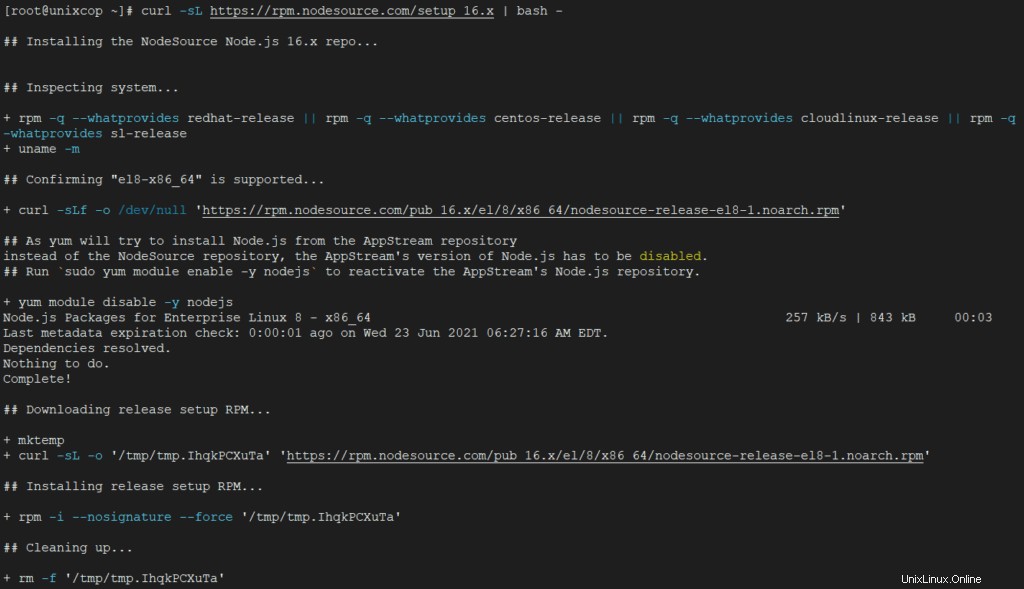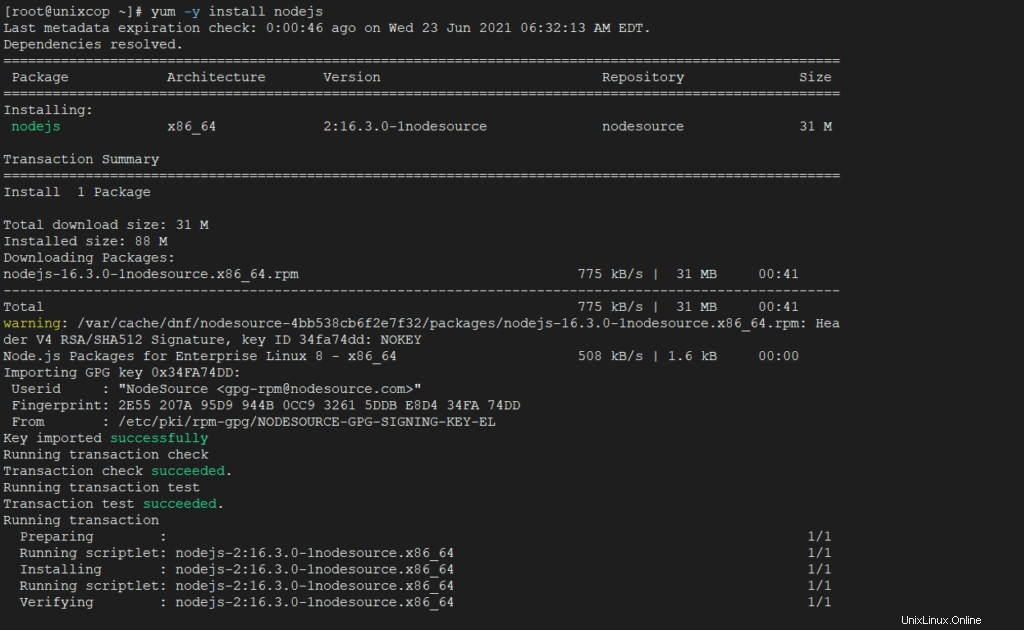Introduzione
Nodejs è una piattaforma JavaScript leggera ed efficiente basata su JavaScript V8 di Chrome motore e NPM è un gestore di pacchetti NodeJS predefinito. Puoi usarlo per creare applicazioni di rete scalabili.
Distribuzioni binarie NodeSource Node.js
Nota: Puoi trovare il NodeSource qui
Installazione di NodeJ in RHEL, CentOS e Fedora
Installazione di NodeJS 16.x in RHEL, CentOS e Fedora
L'ultima versione di Node.js e NPM è disponibile da NodeSource Enterprise Linux ufficiale repository, che è gestito dal sito Web di Nodejs e dovrai aggiungerlo al tuo sistema per poter installare l'ultimo Nodejs e NPM pacchetti.
Per aggiungere il repository per l'ultima versione di Node.js 16.x , usa il comando seguente come root o non root.
Nota: Controlla l'ultima versione di NodeJs
As root
# curl -fsSL https://rpm.nodesource.com/setup_16.x | bash -
No root privileges
# curl -fsSL https://rpm.nodesource.com/setup_16.x | sudo bash -
Successivamente, puoi ora installare Nodejs e NPM sul tuo sistema usando il comando seguente:
# yum -y install nodejs
OR
# dnf -y install nodejs
Installazione di NodeJS 14.x in RHEL, CentOS e Fedora
As root
# curl -fsSL https://rpm.nodesource.com/setup_14.x | bash -
No root privileges
# curl -fsSL https://rpm.nodesource.com/setup_14.x | sudo bash -Installazione di NodeJS 12.x su RHEL, CentOS e Fedora
Se desideri installare NodeJS 12.x , aggiungi il seguente repository.
As root
# curl -fsSL https://rpm.nodesource.com/setup_12.x | bash -
No root privileges
# curl -fsSL https://rpm.nodesource.com/setup_12.x | sudo bash -Facoltativo :Esistono strumenti di sviluppo come gcc-c++ e fare che devi avere sul tuo sistema, al fine di creare componenti aggiuntivi nativi da npm .
# yum install gcc-c++ make
OR
# yum groupinstall 'Development Tools'Installazione di NodeJs in Debian, Ubuntu e Linux Mint
Installazione di NodeJS 16.x in Debian, Ubuntu e Linux Mint
L'ultima versione di Node.js e NPM è disponibile anche dal repository ufficiale di NodeSource Enterprise Linux, che è gestito dal sito Web di Nodejs e dovrai aggiungerlo al tuo sistema per poter installare gli ultimi pacchetti Nodejs e NPM.
Using Ubuntu
$ curl -fsSL https://deb.nodesource.com/setup_16.x | sudo -E bash -
$ sudo apt-get install -y nodejs
Using Debian, as root
$ curl -fsSL https://deb.nodesource.com/setup_16.x | bash -
$ apt-get install -y nodejsInstallazione di NodeJS 14.x in Debian, Ubuntu e Linux Mint
Using Ubuntu
$ curl -fsSL https://deb.nodesource.com/setup_14.x | sudo -E bash -
$ sudo apt-get install -y nodejs
Using Debian, as root
$ curl -fsSL https://deb.nodesource.com/setup_14.x | bash -
$ apt-get install -y nodejsInstallazione di NodeJS 12.x in Debian, Ubuntu e Linux Mint
Using Ubuntu
$ curl -fsSL https://deb.nodesource.com/setup_12.x | sudo -E bash -
$ sudo apt-get install -y nodejs
Using Debian, as root
$ curl -fsSL https://deb.nodesource.com/setup_12.x | bash -
$ apt-get install -y nodejsFacoltativo :Esistono strumenti di sviluppo come gcc-c++ e fare che devi avere sul tuo sistema, al fine di creare componenti aggiuntivi nativi da npm .
$ sudo apt-get install -y build-essentialTest di Nodejs e NPM più recenti in Linux
Per fare un semplice test di nodejs e NPM , puoi semplicemente controllare le versioni installate sul tuo sistema utilizzando i seguenti comandi:
Su RHEL, CentOS e Fedora
# node --version
# npm --version
Su Debian, Ubuntu e Linux Mint
$ nodejs --version
$ npm --versionEcco fatto, Nodejs e NPM ora installato e pronto per l'uso sul tuo sistema.